|
|
|
Sort Order |
|
|
|
Items / Page
|
|
|
|
|
|
|
| Srl | Item |
| 1 |
ID:
166024
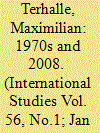

|
|
|
|
|
| Summary/Abstract |
Many Western and non-Western scholars consider the 2008 financial crisis a fundamental caesura, precipitating a decentred globalism. However, they have neither conceptualized the foundations of the dynamics that developed before this caesura nor have they theorized the amalgamating process which ultimately merged the hitherto overlooked and the formerly predominant Western forces and actors. Addressing this deficit, this article presents two innovations. First, it re-conceptualizes the 1970s by integrating two macro-developments: China’s deviation from patterns of the former Third World’s development and the thickening of liberal politico-economic institutions. Their relationship was complementary, but independent, since heterogeneous purposes drove these strands. Neither was disrupted by the end of bipolarity. Thereby, this article offers the first narrative of the years 1970–2008, viewing them as the incubation period of both strands’ simultaneous development before their fusion in ‘decentred globalism’. Consequently, the 1970s supersede International Relations (IR’s) hegemonic benchmark date of 1989–1991. Second, the article accounts for the merging of macro-developments. It argues that, despite regularities, international social life is characterized by heterogeneous purposes derived from different social contexts, reflecting an environment that operates in multidirectional ways. Large trends in the environment, such as those of the 1970s, may coincide at contingent points in time (e.g., 2008). Based on comprehensive reviews of distinct literatures, these two innovations emerge as the key building blocks for the development of a theory of benchmark dates for a ‘decentred’ global order.
|
|
|
|
|
|
|
|
|
|
|
|
|
|
|
|
| 2 |
ID:
078062
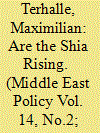

|
|
|
| 3 |
ID:
144110
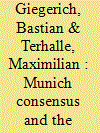

|
|
|
|
|
| Summary/Abstract |
In December 2015, Time chose German Chancellor Angela Merkel as its person of the year, calling her ‘Chancellor of the Free World’. A month earlier, The Economist had named her ‘the indispensable European’. The tendency to project outsized expectations onto the individual reflects a wider phenomenon: German economic and political power in Europe has grown, partly because Germany weathered the 2008 economic crisis relatively well, and partly because of the lethargy of other European powers, including France and the United Kingdom.
|
|
|
|
|
|
|
|
|
|
|
|
|
|
|
|
| 4 |
ID:
107979
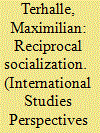

|
|
|
|
|
| Publication |
2011.
|
| Summary/Abstract |
This article asks how the international order can be renegotiated with rising powers. Negotiating understood as a process of socialization is the focus of the article. However, given non-Western states' recent practice of powerfully permeating the existing Western order, it is difficult to explain this process by means of neorealist, constructivist, or liberal socialization. Respectively, they presuppose that some states are already socialized while others need to be adopted into the club of socialized members. In contrast, this article suggests the notion of reciprocal socialization. It explains how rising powers are socialized into the order, while reshaping it when they enter. Two conditions need to be fulfilled to accomplish a socializing process that reflects the reciprocal influencing of states of the Western security community and non-Western veto-players; these are employing "small informal groups" and "personalized interactions." Their application can be viewed in informal operational rules which are, in turn, capable of governing the renegotiations.
|
|
|
|
|
|
|
|
|
|
|
|
|
|
|
|
| 5 |
ID:
091378
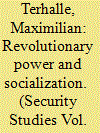

|
|
|
|
|
| Publication |
2009.
|
| Summary/Abstract |
Why do states stay revolutionary for so long? The question of why and how some political players of a country successfully pursue a revisionist strife against the status quo has neither theoretically nor empirically received systematic attention. I use a current policy issue, the crisis regarding Iran, as a single-case study to examine the issue. This article argues that answers are found in the interconnected realms of domestic politics and revolutionary ideas. In Iranian politics specifically, it is both the ideological conservative faction's occupation of key constitutional positions and pursuit of revolutionary ideas, which have caused the recurring and large degree of revolutionary zeal. In turn, this has had a significant effect on the extent of the Islamic Republic's socialization to regional and international politics
|
|
|
|
|
|
|
|
|
|
|
|
|
|
|
|
| 6 |
ID:
091792
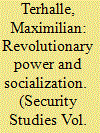

|
|
|
|
|
| Publication |
2009.
|
| Summary/Abstract |
Why do states stay revolutionary for so long? The question of why and how some political players of a country successfully pursue a revisionist strife against the status quo has neither theoretically nor empirically received systematic attention. I use a current policy issue, the crisis regarding Iran, as a single-case study to examine the issue. This article argues that answers are found in the interconnected realms of domestic politics and revolutionary ideas. In Iranian politics specifically, it is both the ideological conservative faction's occupation of key constitutional positions and pursuit of revolutionary ideas, which have caused the recurring and large degree of revolutionary zeal. In turn, this has had a significant effect on the extent of the Islamic Republic's socialization to regional and international politics.
|
|
|
|
|
|
|
|
|
|
|
|
|
|
|
|
| 7 |
ID:
147378
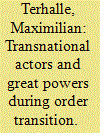

|
|
|
|
|
| Summary/Abstract |
This article rests on the assumption of the “complexity, messiness, power relations, and contested character of the contemporary dualistic system,” which comprises great powers and “superimposed, functionally differentiated global subsystems of world society” (Cohen 2012:5). The article argues that this framework is being shaped by the current transition of global order. In turn, this raises the question how the state-led negotiation of today's order transition can be understood against the backdrop of a post-Westphalian environment. The article challenges the widespread argument pertaining to the “autonomy of transnational actors” by suggesting that the influence of nonstate actors is dependent on a particular institutional context in which the key political questions framing a social order are settled. Whereas research on international institutions and their design simply assumes that this is the case, here it is argued that unless these framing patterns are agreed upon by major powers, the respective order and its elements, that is, institutions and regimes, remain contested or deadlocked. When this happens, the political impact of non-state actors is largely neutralized or strongly weakened and their effective autonomy from great powers is minimized.
|
|
|
|
|
|
|
|
|
|
|
|
|
|
|
|
| 8 |
ID:
102431
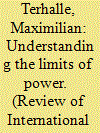

|
|
|
|
|
| Publication |
2011.
|
| Summary/Abstract |
The main thread of this review article is to identify the reasons of how to account for the trajectory of American power in the region. Leaving behind the vast amount of highly politicised and hastily compiled volumes of recent years (notwithstanding valuable exceptions), the monographs composed by Lawrence Freedman, Trita Parsi and Oliver Roy attempt to subtly disentangle the intricacies of US involvement in the region from highly distinct perspectives. One caveat for International Relations theorists is that none of the aforementioned authors intends to provide theoretical frameworks for his examination. However, since IR theory has damagingly neglected history in the last decades, the works under review here, at least in part, compensate for this disciplinary and intellectual failure.
In conclusion, Freedman's in-depth approach as a diplomatic historian, with its underlying reference to the various traditions in US foreign policy thinking, is most illuminating, while Parsi's contestable account focuses too narrowly on the Iran-Israel relationship. Roy's explications fail to show how and why the 'ideological' element in US foreign policy came to carry exceedingly more weight after 2001 than it did in the 1990s.
|
|
|
|
|
|
|
|
|
|
|
|
|
|
|
|
|
|
|
|
|